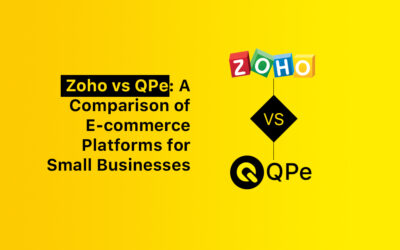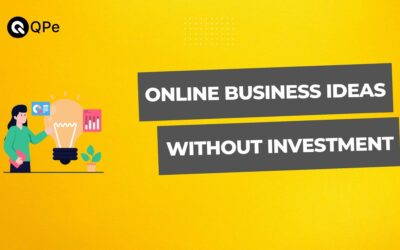Starting an online business feels exciting, but it can get overwhelming fast. You’ve got great ideas and products, but the tech part? That’s a whole other story. What if you could cut through all the complicated stuff and just focus on growing your business?
That’s where QPe comes in. QPe is an all-in-one ecommerce platform that helps you build and manage your online store without needing any coding skills. It’s loaded with everything you need—easy product setup, flexible pricing, integration with Google and social media, plus seamless payment and shipping options. Whether you’re starting from scratch or ready to scale up, QPe makes it simple and affordable.
Ready to launch your business? Try QPe for free today and see how easy it is to succeed online!
TL;DR – How to Start an Online Business
Here’s the rundown if you want to jump right in:
- Check if Your Business Idea Works
- Do Market Research
- Create a Business Plan
- Pick a Memorable Business Name
- Choose the Right Business Structure
- Handle Legal Steps
- Build Your Website and Set Up Fulfillment
- Start Promoting Before You Launch
- Launch and Test Everything
What are the Basics of an Online Business?
It’s all about selling products or services online instead of a physical store. You reach people through the internet, which opens you up to way more customers.
To make it work, you need to know your audience and offer something they actually want. Make sure everything is legal—handle taxes and protect customer data. Set up simple payment options, and promote your business through social media or SEO.
These things? They help your online business grow.

Ways to Identify Your Niche Before You Start Selling Online
Locking down your niche is the most important step before you start selling online. You should focus on a specific group, a topic you enjoy, and something people actually want. Here’s how to get started.
Start With What You Like
Look at your hobbies and skills. What are you already good at? What do you love doing? If you can connect these things to a business idea, you’ll stay motivated.
- Example: If you love plants and spend your weekends gardening, think about eco-friendly gardening tools or offering gardening advice online. The key? Pick something that excites you.
List Several Ideas
Don’t settle on one idea too quickly. Write down a bunch of possible niches based on your interests.
- Maybe it’s affordable tech gear.
- Or luxury fitness plans for busy professionals.
- Think about how you can offer a twist, whether it’s pricing, quality, or serving a specific group of people.
Having options gives you room to find the best fit.
Make Sure People Care
You don’t want to waste time on a niche no one’s interested in. Use free tools like Google Trends or keyword searches to see what people are looking for.
- Example: Search for “vegan skincare” or “DIY home decor” to see how many people are talking about these topics.
- Look for high search volume or growing trends. If there’s no demand, move on to the next idea.
Narrow Down Your List
Once you’ve got a few ideas, focus on the ones that make the most sense. You’ll want something that isn’t too broad or too competitive, where you have a chance to stand out.
- Example: Instead of selling “fitness products,” niche down to something like “meal plans for busy moms.”
- Being specific helps you stand out in a crowded market.
Test the Waters
Before you fully commit, see how people respond to your idea. Check out the competition. Talk to potential customers. You could even build an audience first and get feedback.
- Example: Want to sell homemade candles? Post your designs on social media. See what kind of response you get. If people are interested, you can move forward with confidence.
- You might even try offering pre-orders to gauge demand.
By following these steps, you can find a niche that excites you and has real potential.
Step-by-Step Guide on How to Start Online Business
Thinking of starting an online business? Great! But before you dive in, it’s smart to make sure your idea has real potential. You don’t want to waste time or money on something that won’t work. Let’s break it down for you.
See if Your Idea Works
First things first: Does your idea solve a problem people care about? And will they pay for it? If you can’t answer these questions, your idea might not take off. You need to be sure there’s real interest in what you offer.
Do Market Research
Now, get to know your market. Who are your customers? What problems do they have? Search online for products or services similar to yours. Use Google Trends to see if people are searching for solutions like the one you’re offering. Also, check out your competitors. Figure out how you can stand out.
Don’t stop there. Talk to real people. Ask them if your idea interests them.
Create a Business Plan
Once you know your idea has potential, put together a business plan. It doesn’t need to be fancy. Just clear. Write down your goals, target market, promotion plans, and expected finances. It helps you stay on track and plan for the future.
Pick a Name for Your Business
Your business name matters. It’s the first thing people see. Keep it simple and memorable. Make sure the domain name is available, along with matching social media handles. If the name you love isn’t free, try different variations or extensions like “.net” or “.co.”
Choose a Business Structure
Now, figure out the type of business structure that fits you. A sole proprietorship? It’s easy, but your personal assets aren’t protected. An LLC? It gives you more protection but costs a bit more to set up. If you’re teaming up with someone, a partnership might make sense. If you’re not sure, talk to a legal or tax pro.
Handle the Legal Stuff
Get your business registered with the right authorities. You’ll also need licenses and permits. Don’t forget to register for state and federal taxes. Handling this up front keeps you out of trouble later.
Build Your Website
Your website is where customers connect with your business so make it professional and easy to use. With QPe, you can create a clean, functional online store without needing a developer. Our platform makes it simple to design a website that looks great and works seamlessly, with no coding required.

QPe also helps you manage inventory and shipping all in one place. It’s built to give you full control over your store, so you can focus on growing your business, not the tech stuff.
Ready to get started? Build your website with QPe now!
Start Marketing Before You Launch
Get the word out before your official launch. Use social media, email, and content to build excitement. Create a buzz so that when you do launch, people are ready to buy.
Launch and Test
Before you go live, test everything. Make sure your website works on different devices and browsers. Once you’re sure everything runs smoothly, launch! Announce it on social media, through emails, or ads.
This is only the beginning, but with a solid foundation, you’re ready to grow!
How to Choose the Right Platform for Online Business
Want your online store to succeed? It starts with picking the right platform. It’s got to have the right tools to manage products, attract customers, and help your business grow. Here’s what to look for:
Simple Product Management
Ensure that the platform you choose makes adding, updating, and organizing products easy. You should be able to choose sizes, colors, and bundle products to make shopping smoother.
Flexible Pricing Options
You need a platform that handles discounts, promotions, and even pricing based on where your customers are. Multiple currencies should be no problem.
Personalized Shopping Features
Customers love personalized experiences. Look for a platform that suggests products based on past purchases or searches. It keeps things engaging.
Fast, Flexible Shipping
Offer fast delivery options, like same-day or next-day shipping. Your platform should work with shipping companies to ensure everything gets delivered on time.
Built-in Analytics
You want to track sales, customer activity, and other metrics. A platform with built-in analytics does that. If you need more, it should connect to advanced tools easily.
Google Merchant Integration
More visibility? Yes, please. Pick a platform that helps you list products on Google Shopping for more traffic.
Social Media Sync
Sync your products with Facebook and Instagram. This makes it easier to reach more customers and promote your products across social platforms.
Customer Reviews
Reviews matter. Make sure your platform has a way to show customer ratings and reviews. These build trust and boost sales.
Automatic Tax Calculations
Selling internationally? Get a platform that automatically handles different tax laws and currency conversions. Keep it legal and hassle-free.
Multiple Payment Options
Make paying easy. Your platform should support PayPal, credit cards, and other local payment options for customers around the world.
Track Customer Behavior
You need a clear view of what your customers are doing. Find a platform that tracks each customer’s activity, like what they buy and how they interact with your store.
Stay Future-Proof
Look for a platform that supports selling through voice assistants or smart devices. This keeps you ahead of future shopping trends.
With these features in place, your store will have everything it needs to thrive.
Conclusion
Starting an online store might feel overwhelming, but with the right tools, it becomes an exciting step forward. You can create a stunning storefront, handle payments, manage shipping, and run marketing—all in one place with Qpe. That way, you stay focused on what matters most: growing your business.
With QPe, it’s easier than ever to manage everything. No need for coding skills. Just launch your store, manage products, and start selling. It has you covered with payments, shipping, and even marketing tools.
Plus, it integrates smoothly with platforms like Google and Facebook, helping you reach more people. Affordable, simple, and built for your success—QPe takes the hassle out of running an online store.
Frequently Asked Questions:
How much initial investment do you need to start an online business?
It depends. What do you plan to sell? What tools will you use? If you want to start small, you’ll need to cover basic costs like a domain name and website hosting. Maybe some product inventory if you’re selling physical items. You can get started with just a few hundred dollars, especially if you do everything yourself.
Can you run an online business without technical skills?
Absolutely! Platforms like QPe make it super easy. You won’t need to touch any code. They offer simple tools to manage everything—from adding products to handling payments and shipping.



